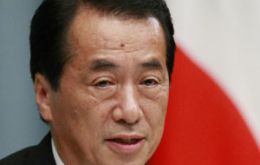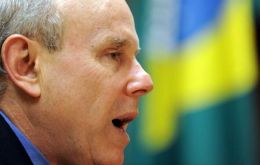MercoPress. South Atlantic News Agency
Economy
-
Monday, November 29th 2010 - 20:01 UTC
Unasur ban‘huge negative impact’ on Falkland Islands?

“A HUGE negative impact on us,” is how one Falklands fishing company views the Union of South American Nations’ declared intention to close their ports to Falklands flagged vessels, or in their words, ‘the illegal flag of the Malvinas’.
-
Monday, November 29th 2010 - 05:02 UTC
Europe confirms 85 billion Euros for Ireland; unveils Stability Mechanism

European ministers reached Sunday an agreement over a bail-out for the Irish Republic worth about 85 billion Euros. The deal will see 35bn euros go towards propping up the Irish banking system with the remaining 50bn euros to help the government's day-to-day spending.
-
Saturday, November 27th 2010 - 13:22 UTC
Japan approves another stimulus package to combat deflation and strong Yen

Japan's parliament has passed a stimulus package worth about 61billion US dollars, designed to kick-start the country's fragile economic recovery. The government had already introduced several stimulus packages.
-
Friday, November 26th 2010 - 23:59 UTC
Russia orders 3 million tons of Argentine animal-feed corn; first delivery January

Russia is interested in purchasing 3 million tons of Argentine animal feed corn to supply its domestic market following the catastrophic drought and fires suffered by the country during summer months in the northern hemisphere.
-
Friday, November 26th 2010 - 16:25 UTC
Mantega proposes “diluted” inflation index with no fuel or food items included

Brazil Finance minister Guido Mantega is proposing a “dehydrated” inflation index with the purpose of reducing interest rates faster under the incoming administration of president-elect Dilma Rousseff, reports the influential O Estado de Sao Paulo.
-
Thursday, November 25th 2010 - 20:58 UTC
World corn production slightly lower; lowest inventory in four years

World corn production will be 0.5% lower than forecast last month as reduced U.S. and Brazilian crops result in smaller-than-estimated inventories, the International Grains Council reported on Thursday.
-
Thursday, November 25th 2010 - 04:29 UTC
First possible suspected case of “mad cow” in humans sounds alarm bells in Brazil

Brazilian health officials said this week that a suspected case of Creutzfeldt-Jakob disease, a fatal illness that destroys brain tissue, probably wasn’t caused by eating beef of an animal infected with the mad cow sickness.
-
Thursday, November 25th 2010 - 04:25 UTC
Large sovereign bond trader adheres to Germany’s “hair-cut” proposal

One of the world's largest private buyers of government bonds says the private sector should bear some of the cost of financial rescues such as for the Irish Republic. The comments came from Mohamed El-Erian, chief executive of Pimco, which holds investments worth 1.3 trillion US dollars (equivalent to 80% of Brazil's GDP).
-
Thursday, November 25th 2010 - 04:19 UTC
UK main supermarkets agree to origin labels for meats and dairy products

UK's main supermarkets have signed up to a new voluntary code of conduct on food labelling to provide consumers with clearer information on the origin of their food. The new principles apply to meat and processed meat products as well as dairy products.
-
Wednesday, November 24th 2010 - 20:55 UTC
US on the path of Japan’s stagflation of 18 years ago, says Nobel Prize

Economics 2008 Nobel Prize Paul Krugman said the United States is heading along a path of stagnation and deflation similar to that of Japan 18 years ago given the critical economic situation and the uncertain political scenario following the recent mid term elections that brought to Congress diehard Republicans.
